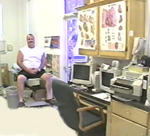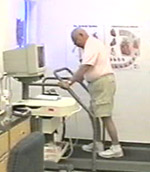


 |
 |
|||||||
 |
||||||||
|
|
||||||||
|
|
|
|
|
|
|
|
|
|
|
|

|
The Nuclear test is performed in our office based Nuclear Imaging Lab. The test is a noninvasive procedure with minimal discomfort. It provides a detailed look into the function of your heart. An exercise stress test or a medication will be used to increase the blood flow through your heart. This test will determine if the arteries that supply blood and oxygen to your heart are becoming narrowed by plaque. If there is a blockage, the nuclear scan will help your physician decide the best course of treatment. |
|
|
|
|

|
The stress test helps your physician determine how healthy your heart is. It is designed to compare the performance of your heart when you are at rest with its performance as you engage in progressively more vigorous exercise. If you have a heart problem, the test can show how well your treatment is working. It can also provide guidance as to the type and amount of exercise that is best for you. The coronary arteries supply blood and oxygen to the heart muscle continuously. The stress test compares how efficiently these arteries supply your heart muscle when you exercise and rest, and how well your heart muscle reacts to work or exertion. Try to get a good night's rest the night before the test. On the day before, ask your doctor if you should take your usual medicines or skip them. For the test, wear comfortable, loose-fitting clothes and comfortable walking shoes. You should stay away from alcohol, caffeine, and cigarettes for several hours before the test since these substances may alter the results. |
|
|

|
|
Cardiac catheterization is a frequently used and reliable diagnostic test that allows a physician to observe a functioning heart. It is most often used to evaluate coronary artery disease, as well as valvular, congenital, and primary myocardial diseases. During cardiac catheterization, a long, narrow flexible tube or catheter is inserted into an artery in the upper thigh near the groin area. While the physician monitors the patient's progress on an x-ray screen, the tube is gently fed through the artery up into the heart. An iodine dye is injected, which outlines the heart chambers and blood vessels. Cardiac catheterization is not only a valuable diagnostic procedure; it can be used to treat certain problems. For example, if a blood clot is present, medication can be dispensed to break up the clot. Also, a balloon catheter may be inserted into an artery and then inflated so that the artery expands and blood flows more easily. The test is performed in the cath lab. The patient receives a sedative before the test begins and an injection of local anesthesia at the site of the incision. There may be a sensation of pressure as the catheter is inserted, but there should be no pain. The entire procedure takes about 30 minutes. Most patients are able to resume light activity within 4 - 8 hours and eat as soon as they want to. It is usually necessary to take it easy for a few days after a catheterization. Among diagnostic tests, cardiac catheterization has proven to be extremely effective and safe procedure that is instrumental in diagnosing and even treating heart problems. |
|
|
|
Holter Monitor Pacemaker and Defibrillator Clinic Echocardiography Myocardial Sestamibi Adenosine Exercise |
Angiography Peripheral Angioplasty Peripheral Intravascular Ultrasound Peripheral Vascular Ultrasound Carotid Ultrasound Doppler Flow Studies |
|
Coronary Angiography Percutanious Transluminal Coronary Angioplasty (PTCA) Coronary Atherectomy/Rotobladder Intra-coronary Stents Brachytherapy Permanent Pacemakers Transesophageal Echocardiography (TEE) Intravascular Ultrasound |